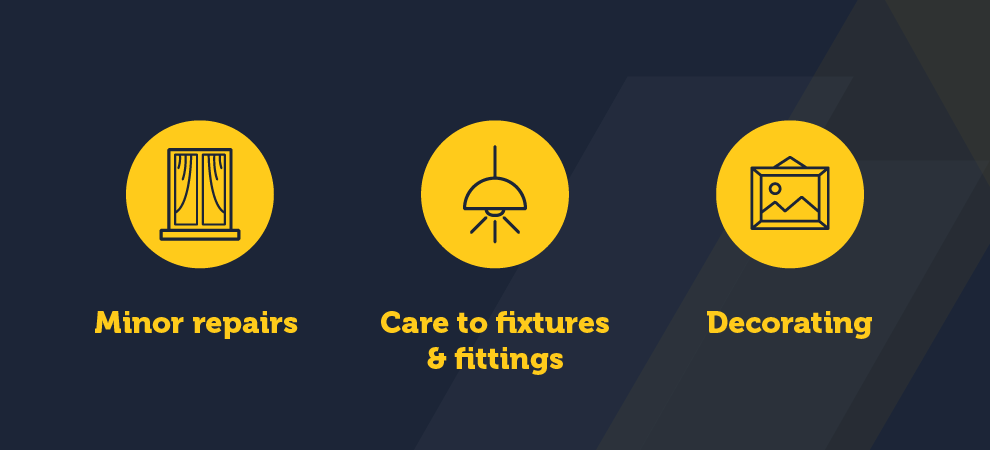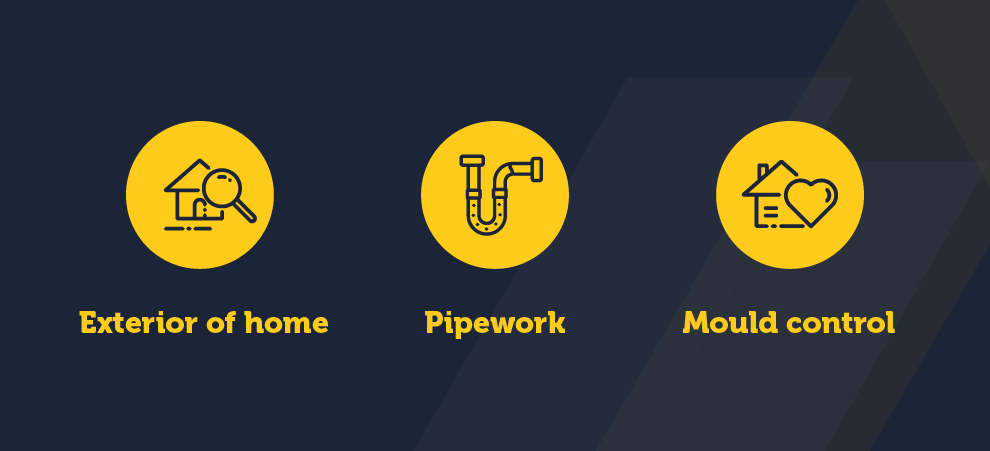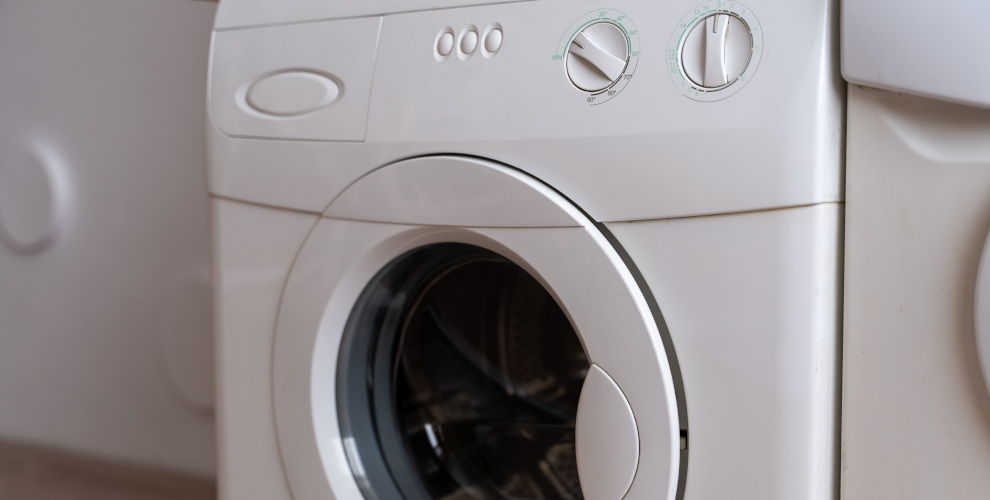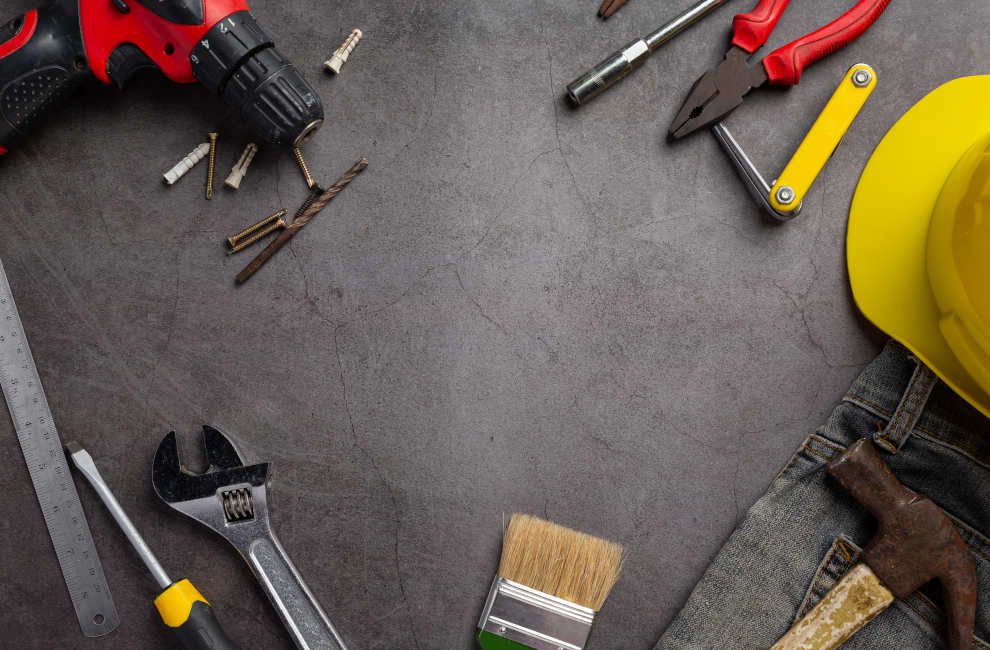If you’re a tenant in a private, council or housing association rented property, you may be wondering what you are responsible for when it comes to repairs. In our latest blog, we explain tenant responsibilities, as well as landlord responsibilities so that you are completely up to speed.
What repairs is the tenant responsible for?


Tenants are mainly responsible for the following things in their rental property:
- Using your home in a ‘tenant like’ way and ensuring it is looked after (regardless of whether you have a written or an oral tenancy agreement).
- Informing your landlord if any repairs are needed.
- Allowing access if any repair work is needed.
- Ensuring you have a duty of care towards your visitors.
- Fixing your own furniture or appliances.
- Replacing all light bulbs where they are easily accessed
- Keeping all drains and sinks free from hair and potential blockages
Using the home in a tenant-like way
- Any minor repairs (such as changing fuses and light bulbs) should be carried out by yourself.
- Your home should be kept reasonably clean.
- Damage should not be caused to the property (either by yourself or your visitors).
- Take care to use fixtures and fittings properly (such as not blocking a toilet by flushing something unsuitable down it).
In addition, your tenancy agreement may also express terms about what other areas you are responsible for in regards to repairs. These may include:
- Decorating your home.
- Keeping your garden or outside area in a reasonable state.
Telling the landlord about repairs
If any repairs occur in the property (even if they are quite small and you’re not overly concerned about having them fixed), then you are responsible for telling your landlord about them in order for them to be carried out.
Allowing access for repairs to be made
There is a term in most tenancy agreements which states that you must give your landlord access in order for repair work to be carried out.
In regards to notice, this should be at least 24 hours in advance and at a reasonable time of day (for example between 9am and 5pm, so not too early in the morning or late in the evening), which you should be able to agree with your landlord.
It’s also important to note:
- Your landlord or their agent can’t enter without your permission and you can refuse access if you wish, however you should be aware that this will constitute breaking a term in your tenancy agreement. In this instance, your landlord may be able to get a court order in order to gain access.
- In case of an emergency, your landlord can force entry if they can’t get hold of you (for example if a pipe has burst and there is a water leak).
- If a communal area such as an entrance hall requires repairs, there isn’t a requirement for your landlord to give you notice for access.
Duty of care towards your visitors
You need to ensure that your visitors and their belongings are reasonably safe when in your home as part of your duty of care. However, it’s important to know that this is only applicable if the visitor has been invited or allowed into your home.
What repairs is the landlord responsible for?


When it comes to landlord repairs law, if your home is rented from a housing association landlord, then they will be responsible for most repairs in your home. However, all landlords will generally be responsible for the following:
- The exterior and structure of your home (such as the roof, walls, drains, foundations, guttering, external pipes, external doors and windows).
- Baths, basins, sinks and toilets inside your home, as well as their pipework
- Other items such as electrical wiring, water and gas pipes, boilers, water tanks, radiators, gas fires, fitted electric fires or fitted heaters.
- If your tenancy began on or after 15 January 1989, your landlord is also responsible for the common parts of a building too, such as entrance halls, stairs and lifts where a managing agent is not appointed.
It’s important for you to be aware that your landlord cannot include a term in your agreement that would pass on any of their repair responsibilities to you, as this would not have any force in law.
Fit for human habitation
Your home is classed as being “unfit for human habitation” if it isn’t safe to live in (regardless of whether the issue was there at the start of the tenancy or appeared later), and this is something that your landlord repair obligations include.
Your home will be “unfit for human habitation” in the following instances:
- Having a serious problem with damp or mould.
- Being too hot or too cold.
- Having too many people living in it.
- Having an infestation problem with pests like rats or cockroaches.
- Not having a safe water supply.
However, there are some exceptions where your landlord doesn’t have to make sure your home’s fit for human habitation:
- If you caused the problem by not looking after your home properly (e.g. not using the extractor fan when having a shower).
- If you have done something unreasonable (e.g. leaving candles burning when you go out).
What are my landlord’s obligations for appliances such as the washing machine?
If you have had any of your own appliances installed (such as a washing machine), then you are responsible for the repairs.
If your landlord has supplied any electrical or gas appliances, then they will be responsible for the repairs as part of their landlord duty of care.


What else do I need to know?
If damage is accidentally or deliberately caused by you or someone visiting your home, you’ll be responsible for repairing it. You should still tell your landlord about this and the repair work that will be needed, and they may agree to you fixing it yourself or doing the work themselves and recharging the cost to you.
If you’re in need of some guidance and support on repairs, our property experts can assist, regardless of whether you’re a landlord or tenant.



















